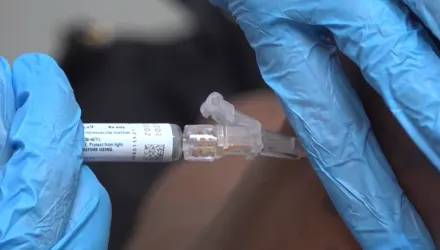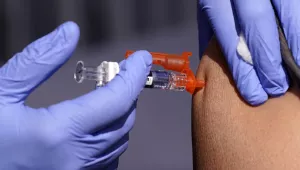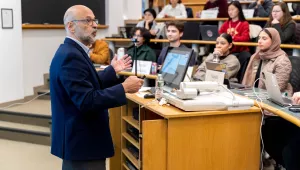
Download the full paper:
Introduction
Dr John Nkengasong, Head of the African Centres for Disease Control and Prevention, has described the COVID-19 pandemic as “an existential threat to the continent.” Peter Piot, one of the scientists who discovered the Ebola virus and who has spent his professional life battling infectious diseases, observed recently that “without a Coronavirus vaccine, we will never be able to live normally again. The only real exit strategy from this crisis is a vaccine that can be rolled out worldwide.” The updated forecasts by the World Health Organization, released on May 7, 2020 warn that up to 190,0001 people could die from COVID-19 in Africa, and many have forecast deeply worrying economic impacts for the continent.
Against the backdrop of recent epidemiological analyses and economic forecasts, this paper sets out the key threats that COVID-19 poses to Africa’s 54 nations in light of the continent’s health and economic preparedness. Recognizing the critical action taken so far by many of Africa’s national governments and others outside the continent, this paper looks ahead to the next phase of the crisis and highlights specific ways in which international partners can assist African countries in the immediate months ahead.
Drawing on recent analyses from a range of organizations and experts, the paper first outlines the spread of COVID-19 in Africa to date and lays out the factors which will influence its future trajectory. Uncertainty frustrates current attempts at epidemiological predictions, and key questions about how the virus will interact with Africa’s distinctive and varied characteristics remain unanswered. Not enough is yet known about the impact of Africa’s demography, climate, and existing-health burden to make reliable forecasts about transmission rates or Case Fatality Rates (CFRs). As of yet, the virus has not spread to the extent that many early commentators feared, leading some to suggest that many outside the continent are vulnerable to ‘Afro-pessimism.’ The Senegalese academic Felwine Sarr has gone on to argue that “the Europeans are worried about us but over here we are worried about them.”
Legitimate concerns have been raised about those outside of the continent depicting African states ‘without agency,’ and as passive victims of this pandemic.2 The paper recognizes the decisive action, multilateral cooperation, and global leadership, which has already been taken by African states, before noting the supporting role that parts of the international community have played. Countries across the globe can learn valuable lessons from the response of African states, just as African states are already learning from and working with those further ahead on the epidemic curve as they assess how best to re-open their economies.
Commentary is far easier than governing even in times far less challenging than these. At this time, policy makers around the world are being asked to reach profoundly difficult decisions, which will affect the lives and livelihoods of millions of their citizens, on the basis of still imperfect information. While the epidemiological picture remains unclear, and it is, as yet, too early to know the disease path of COVID-19 in Africa, this paper argues that the damaging economic and social consequences already resulting from the pandemic response within and beyond the continent make the case for further immediate action from the international community.
The paper argues that notwithstanding this present epidemiological uncertainty, it is already clear that COVID-19 will threaten fragile health systems and fragile economies across Africa. Even at the lower end of epidemiological estimates, COVID-19 and its effects will have potentially devastating ‘secondary effects’ and this paper assesses these vulnerabilities before outlining those at risk on the continent. Whilst the focus of this paper is the impact of the virus within Africa, given this is a crisis of ‘our connected world,’3 it also highlights the risk that a failure to assist Africa’s Covid-19 fight at this time carries for the broader international community.
Throughout the long course of human history, outbreaks of infectious diseases have devastated populations, weakened empires, and swept across continents. Yet, Covid-19 is the first pandemic of our interconnected, global age. It has struck the world at a time when the architecture of global cooperation has been weakened by years of nationalism and populism. It is challenging not only our health systems but also our understanding that in these circumstances—and given our interconnectedness—to keep safe locally requires us to act both locally and globally. Whether our divided and weakened international community develops that understanding and finds the capacity to act together to assist Africa will be a true test of modern multilateralism. Whether together we rise to this challenge will be a test not only of our capacity to fight the virus but also of our understanding that in this struggle, against a virus with no respect for borders, we are all on the same side.
It is now three months since COVID-19 was first reported in Africa4 and notwithstanding the continuing uncertainty, this paper concludes by recommending three ‘no regret’ decisions that can and should be taken by the international community in the next three months to assist Africa’s COVID-19 fight.
1 World Health Organization: ‘Up to 190 000 People Could Die of COVID-19 in Africa If Not Controlled,’WHO | Regional Office for Africa. Available at: https://www.afro.who.int/news/new-who-estimates-190-000-people-could-die-covid-19-africa-if-not-controlled. (Accessed May 16, 2020)
2 Nielsen, Kelsey. ‘The Problem with Predicting Coronavirus Apocalypse in Africa.’ Available at: https://www.aljazeera.com/indepth/opinion/problem-predicting-coronavirus-apocalypse-africa-200505103847843.html (Accessed May 12, 2020)
3 Miliband, David. ‘We’re on Our Way to Over One Billion Cases. We Won’t Beat COVID-19 With ‘My Country First,’” Newsweek (May 4, 2020). Available at: https://www.newsweek.com/david-miliband-covid-one-billion-cases-my-country-first-1501876
4 World Health Organisation. ‘COVID-19 Cases Top 10 000 in Africa’, WHO | Regional Office for Africa, https://www.afro.who.int/news/covid-19-cases-top-10-000-africa. (Accessed 18 May 2020). Download the PDF using the button above for the full paper.
Alexander, Douglas. “Three No-Regret Decisions for the Next Three Months: How Partners Can Assist Africa’s COVID-19 Fight.” June 2020





